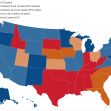Texas joined South Carolina and Idaho last week in banning nearly all abortions if a fetal heartbeat is detected. The law is set to be enforced in September; it now requires a physician to check for a fetal heartbeat and makes any individual who knowingly assists with an unlawful procedure legally liable.
A fetal heartbeat can begin as early as six weeks, which is before many women even understand they are pregnant. The law only permits abortions in these cases in the event of a “medical emergency” and prohibits providers from performing an abortion on pregnancies that resulted from incest or rape, stating that emergency contraception for victims is already available from “public and private agencies” in the state.
The new legislation also expands who is legally liable for the performance of an illegal abortion. Anyone who assists an individual to access an abortion, “including paying for or reimbursing the costs of an abortion through insurance or otherwise” will face a $10,000 fine for each occurrence.
Texas Governor Greg Abbott applauded Senate Bill 8 during a signing ceremony stating, "Our creator endowed us with the right to life and yet millions of children lose their right to life every year because of abortion."
Last month, more than 300 attorneys practicing in Texas sent a letter to lawmakers criticizing the legislation as unconstitutional and claiming the passing of this law “weaponizes the judicial system.” However, opposition to the bill fell on deaf ears as both lawmakers and non-profit pro-life activists applauded the law as a “landmark victory.”
There were 619,591 abortions reported to the CDC in 2018 throughout the United States, a one percent increase from 2017, but a 24 percent decrease in total since 2009. The CDC found that more than 75 percent of the abortions performed were at or before nine weeks of gestation, and over 90 percent were performed at or before 13 weeks. The Texas Tribune reported that more than 56,000 abortions were performed in Texas in 2019 with a majority performed within the first trimester.
Over the years, Texas has restricted the performance of abortions as well as made it increasingly difficult for abortion clinics to keep their doors open. In 2013 there were 40 clinics across the state, and this number was reduced to just 22 by 2019 because of restrictive laws and requirements by the state. Those 22 clinics are mainly in metropolitan centers and are responsible for servicing Texas’s female population of nearly 15 million.
In 1973, the Supreme Court legalized the performance of abortion nationwide prior to a fetus’ viability outside the womb, which usually occurs at 24 weeks of the pregnancy. The Roe v. Wade decision has withstood attacks for decades; however, many supporters are worried that the now majority conservative Supreme Court could make monumental changes to the law, limiting access to life-saving health care for women across the country. Just last Monday, the Supreme Court agreed to hear a case regarding Mississippi’s law that bans almost all abortions after 15 weeks. Should the law be upheld, it will significantly shorten the time women have to decide on or seek an abortion.
A study conducted by the Guttmacher Institute found that reducing access to abortion services does not reduce the rate of abortions. Countries that have restrictive laws on abortions have the highest rates of abortion. When access to legal and safe medical procedures is restricted, women are then forced to look for illegal and usually unsafe abortions. Before the landmark decision of Roe v. Wade, an estimated 1.2 million U.S women received illegal abortion services every year, killing as many as 5,000 each year.
The movement to ban abortion across the country is gaining momentum. The Guttmacher Institute reported that "the year 2021 is well on its way to being a defining one in abortion rights history.” The ‘heartbeat’ abortion bill had lagged in the Texas legislature for the past two years and was not a priority for many lawmakers. However, it has been pushed into the center stage of state and national political discussion as other states begin to further restrict abortions as well. This year alone, Arkansas and Oklahoma both passed near-total abortion bans, and South Carolina and Idaho passed ‘heartbeat’ abortion bans similar to the one in Texas.






